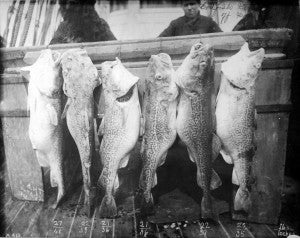Disaster Funds and Cod Problems: Setting the Record Straight about Fisheries in New England

New England has received a lot of media attention recently about the fisheries disaster declared by President Barack Obama. The precipitous decline in groundfish in New England waters has created an imminent need to help fishermen and fishing communities that depend on stable healthy fish populations.
It is important to dispense with false rumors and to set the record straight. There is an effort on the part of some to claim that catch shares are somehow responsible for the New England groundfish population declines. To claim this is to suggest that fishermen have exceeded their catch limits and are not following the rules. This is simply not true. In fact, sector fishermen have been working hard to stay under their catch limits, and in some cases remain well below these limits.
In reality, the disaster declaration was based on the fact that there are changes happening in the ecosystem that are impeding the rebuilding of fish populations. We are forced to confront the frightening reality that fishing is changing in part because our oceans are changing. We are dealing with a resource problem, not a management problem.
The NOAA Northeast Fisheries Science Center recently released a report indicating that water temperatures in the Northeast have reached record highs. These warming ocean temperatures are shifting Atlantic cod distributions and affecting migrations of other species. Warming oceans and ocean acidification will continue to change the distribution and abundance of fisheries as time goes on—which will have implications for fishermen across all US coasts and globally. But solutions exist that can be made now to invest in the long-term sustainability of the fishery.
First, we are advocating for better stock assessments so that fishermen can trust that they are fishing according to the best available science. This improvement begins with improving the quality and quantity of data used in assessments, particularly catch information. This will provide use with a better understanding of the fishery and lead to better data on the current status of fisheries.
Second, we need more comprehensive and cost effective monitoring options to bolster real time data about what is being caught on every fishing trip. Disaster funds should support fishermen by covering these costs. Covering the costs of catch monitoring will encourage fishermen to participate in collecting and improving fishery science and groundfish management.
Third, accumulation limits and other fleet diversity measures should be put into place to protect small scale fishermen. Putting caps in place will help ensure that the hardworking, small scale fishermen can continue to innovate and survive through this time of economic hardship.
With focused attention on improving science and accountability and collaboration between fishermen and scientists, we can get through this fishery disaster. It has never been more important to stick to the facts and focus on a sustainable future.










